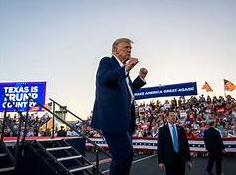The former president’s rhetoric is getting more extreme.
The crowd that gathered in Waco, Texas, on Saturday for Donald Trump’s first major rally of his 2024 presidential campaign experienced all the hallmarks of a classic Trump performance. There was the demonisation of opponents and enemies (the Florida governor Ron DeSantis, and Trump’s biggest rival for the Republican nomination, was disloyal and “dropping like a rock” in polls; prosecutors investigating him were “absolute human scum”). There was the bizarre boasting (he recalled taking a “pretty tough” cognitive test when he was in the White House, which he “aced”). And there was unrepentant sexism (he referred to Stormy Daniels, the adult actress who he is accused of paying off after an alleged affair, as “horse face”).
There were, however, also some new notes to Trump’s performance. The rally’s location has been widely interpreted as a signal to his base: the Texan city of Waco was the setting, 30 years prior, of a deadly siege and weeks-long stand-off between law enforcement and members of the apocalyptic religious cult, the Branch Davidians. More than 80 members of the cult died, as well as four US federal agents. The siege was described by AP as “a touchstone for far-right extremists and militia groups.” Team Trump claimed that the location was merely chosen for its proximity to other major Texan cities, the enthusiasm of its residents, and its infrastructure.
Despite this, the choice of Waco raised eyebrows. To some, it appeared to be a deliberate attempt to evoke a sense of martyrdom and persecution, aligning his campaign with an image of resistance against the establishment. The symbolism was clear: Trump’s rhetoric throughout the rally was infused with a heightened sense of grievance, victimhood, and religious fervor, blending his political persona with a quasi-religious aura. This was not just about politics; it was about a larger, almost messianic struggle.
Trump’s use of religious imagery and language has been a growing trend in his rallies and public appearances. He frequently paints himself as a defender of the “true” American values, positioning his movement as a battle between the forces of good and evil. The evangelical Christian community, which has been a key part of his political base, was deeply invoked in Waco. Trump’s rally not only underscored his appeal to these voters but also highlighted how his campaign is shifting toward a more populist, religious identity. His rhetoric, which used to be rooted in economic populism and American nationalism, is increasingly tapping into the spiritual and moral undercurrents of the nation’s right-wing movements.
This religious turn marks a significant evolution in Trump’s appeal, as he now seeks to present himself as a leader of a broader cultural and moral crusade, one that aligns with the most extreme fringes of American politics. By framing his political battles as not just a contest of policy but a fight for the soul of the country, Trump is moving further into territory previously occupied by far-right movements that blend politics with religion. His rallies are increasingly filled with religious overtones, suggesting that his campaign is evolving into more than just a political endeavor—it’s becoming a movement that claims spiritual and moral legitimacy.
While some may see this as a calculated move to mobilize his base and tap into the fervor of evangelical and nationalist voters, it’s also a sign of how Trump is testing the boundaries of American politics. By invoking religious symbolism and aligning himself with far-right extremists, he is creating a potent combination of political populism and religious fervor that could further deepen the divisions within the nation. As Trump’s campaign gains momentum, his rhetoric is likely to become even more extreme, pushing the boundaries of what is considered acceptable political discourse.
The Waco rally may have marked just the beginning of a much larger and more intense effort to connect Trump’s 2024 campaign with far-right religious movements, potentially changing the dynamics of American politics in ways that could have long-lasting consequences. The question remains whether the broader electorate will embrace this shift or reject it as a step too far into extremism.

